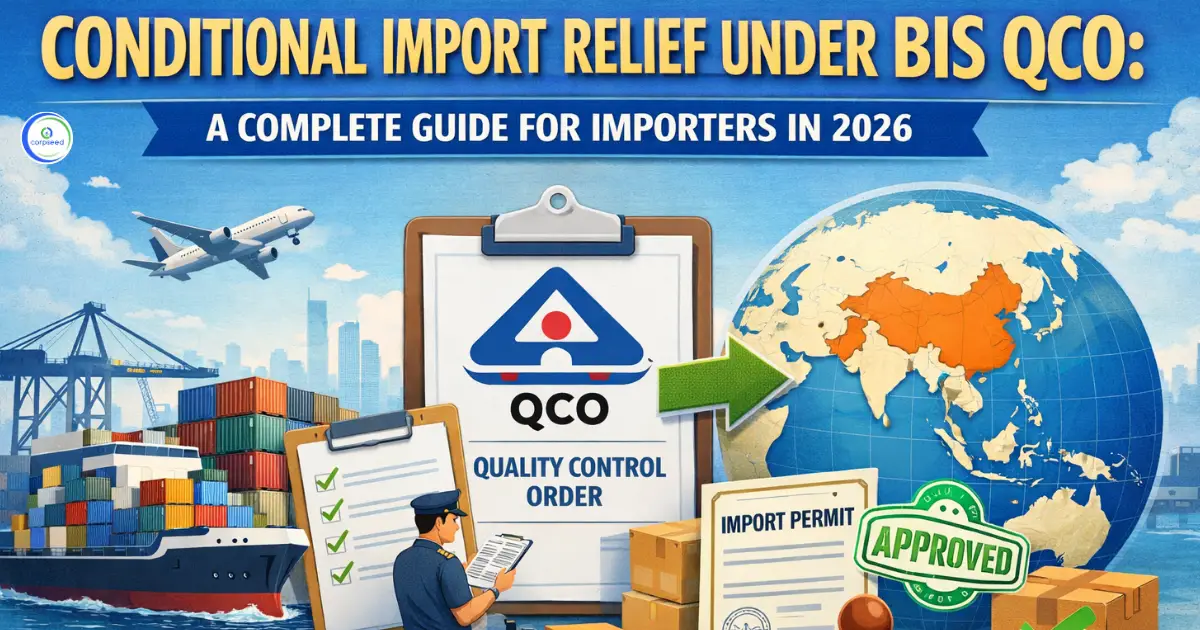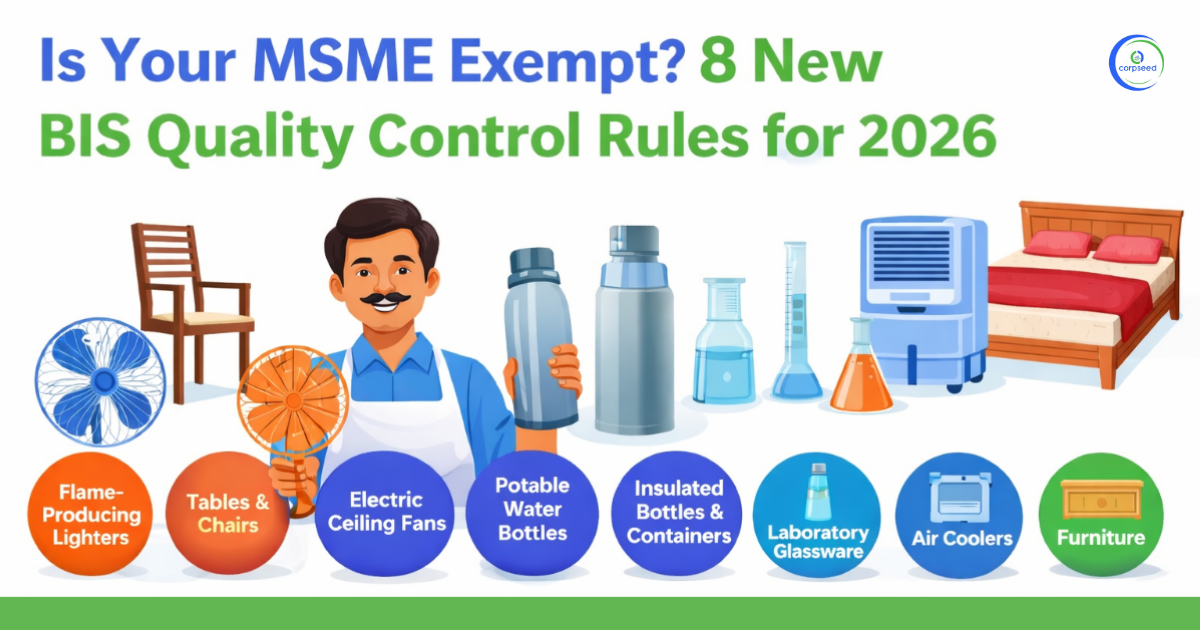In recent years, there has been a focus on ensuring the safety and quality of electrical appliances used in homes, commercial spaces, and similar environments. With growing concerns about electrical hazards and equipment malfunctions, the Ministry of Commerce and Industry, through the Bureau of Indian Standards (BIS), has introduced the Safety of Household, Commercial and Similar Electrical Appliances (Quality Control) Order, 2025. This order sets strict guidelines to regulate the manufacture and sale of electrical equipment, ensuring that products meet safety standards that protect consumers from electrical accidents. Regulations are necessary not only for safety but also to enhance the overall quality of electrical goods on the market.
What is the Safety of Household, Commercial and Similar Electrical Appliances (Quality Control) Order, 2025?
The Safety of Household, Commercial and Similar Electrical Appliances (Quality Control) Order, 2025 is a regulatory framework introduced by the Ministry of Commerce and Industry to ensure the safety of electrical appliances in India. This updated version of the 2024 Quality Control Order requires that all electrical equipment manufactured for domestic, commercial, or similar use meet specific safety standards.
This applies to equipment with rated voltages up to 250 V for single-phase and 480 V for other equipment. The order requires manufacturers to obtain BIS registration and certification to sell these products in the country. BIS certification guarantees that equipment meets the necessary safety and quality standards, reducing the risk of accidents such as electric shocks and fires. The mandate aims to improve product safety, enhance consumer protection and ensure that electrical appliances in India are reliable and trustworthy for everyday use.
Table of Contents
- What is the Safety of Household, Commercial and Similar Electrical Appliances (Quality Control) Order, 2025?
- Objective of the Safety of Household, Commercial and Similar Electrical Appliances (Quality Control) Order, 2025
- Key Provisions of the Safety of Household, Commercial and Similar Electrical Appliances QCO, 2025
- Table of Electrical Appliances Covered under the Order
- Impact on the Electronics Industry
- Penalties for Non-Compliance
- Conclusion
--------------Blog Contact Form-------------
Objective of the Safety of Household, Commercial and Similar Electrical Appliances (Quality Control) Order, 2025
The key objectives behind the implementation of this order are as follows:
- Consumer Protection: Ensuring electrical equipment meets safety standards to prevent accidents such as electric shock, fire, and other potential hazards.
- Uniform Quality Standards: By implementing BIS certification, the mandate ensures that all manufacturers adhere to a uniform set of quality control standards, making it easier for consumers to trust the quality of electrical appliances.
- Promoting Domestic Manufacturing: The order also encourages domestic manufacturers to follow international standards, which can help them increase product quality and increase exports.
- Environmental Considerations: Regulations are not only about safety but also about the environmental impact of electrical equipment, ensuring that they do not harm the environment when in use or disposal.
Key Provisions of the Safety of Household, Commercial and Similar Electrical Appliances QCO, 2025
Several key provisions are outlined in this order, designed to regulate the electrical appliance market:
Short Title, Application, and Commencement: This order is called the Safety of Household, Commercial, and Similar Electrical Appliances (Quality Control) Order, 2025. It is applicable on electrical appliances used in household, commercial, or similar applications. The order comes into effect on March 19, 2026.
Compulsory Standard Mark: Appliances covered by this order must conform to the relevant Indian Standards and bear the Standard Mark under a BIS license as per Scheme-1 of Schedule-II of the BIS (Conformity Assessment) Regulations, 2018.
Exemptions:
Goods manufactured for export are exempt from these regulations.
Small and micro enterprises will have extended timeframes to comply with the standards (up to six months).
Appliances manufactured or imported before the implementation date of the order can still be sold, provided they are declared and accounted for.
BIS Certification: BIS registration and certification are mandatory for electrical appliances to be legally sold in India.
Research and Development Exemption: Small quantities of goods imported for research and development purposes are exempt, provided they are not sold commercially.
Table of Electrical Appliances Covered under the Order
The following table lists electrical appliances that fall under the scope of the Safety of Household, Commercial and Similar Electrical Appliances (Quality Control) Order, 2025:
| S. No. | Goods or articles | Indian Standard | Title of Indian Standard | Date of implementation in general (other than micro and small enterprises) | Date of implementation for small enterprises | Date of Implementation for micro Enterprises |
|
All electrical appliance intended for household, commercial or similar application with rated voltage not exceeding 250 V for single-phase appliances and 480 V for other appliances including direct current supplied appliances and battery operated appliances Illustrative list of electrical appliances is given below: |
IS 302 (Part 1): 2024 IEC 60335-1: 2020 | Household and Similar Electrical Appliances - Safety Part 1 General Requirements | 19th March, 2026 | 19th June, 2026 | 19th September, 2026 | |
| 1 | Vacuum Cleaners and Water Suction Cleaning Appliances | |||||
| 2 | Spin Extractors | |||||
| 3 | Cooking Ranges, Hobs, Ovens and Similar Appliances | |||||
| 4 | Electrical Shavers Hair, Clippers and Similar Appliances | |||||
| 5 | Tumbler Dryers | |||||
| 6 | Warming Plates and Similar Appliances | |||||
| 7 | Frying Pans, Deep Fat Fryers and similar appliances | |||||
| 8 | Appliances for Heating Liquids | |||||
| 9 | Massage Appliances | |||||
| 10 | Electric Forced Convection Ovens, Steam Cookers and Steam-Convection Ovens | |||||
| 11 | Electric Heating Tools | |||||
| 12 | Electric Steam Cookers | |||||
| 13 | Insect Killers | |||||
| 14 | Electric Call Bells and Buzzers for Indoor Use | |||||
| 15 | Electric Water Boilers | |||||
| 16 | Electric Coffee Makers | |||||
| 17 | Electric Bean Slicers | |||||
| 18 | Electric Berry-juice Extractors | |||||
| 19 | Electric Can Openers | |||||
| 20 | Electric Centrifugal Juicers | |||||
| 21 | Electric Churns | |||||
| 22 | Electric Citrus-fruit Squeezers | |||||
| 23 | Electric Coffee Mills not exceeding 500g hopper capacity | |||||
| 24 | Electric Cream Whippers | |||||
| 25 | Electric Egg Beaters | |||||
| 26 | Electric Food Processors | |||||
| 27 | Electric Grain Grinders not exceeding 3l hopper capacity | |||||
| 28 | Electric Graters | |||||
| 29 | Electric Ice-Cream Machines, including those for use in refrigerators and freezers | |||||
| 30 | Electric Knife Sharpeners | |||||
| 31 | Electric Knives | |||||
| 32 | Electric Noodle Makers | |||||
| 33 | Electric Potato Peelers | |||||
| 34 | Electric Shredders | |||||
| 35 | Electric Sieving Machines | |||||
| 36 | Slicing Machines | |||||
| 37 | Electric Hot Plates | |||||
| 38 | Single Walled Baking Ovens | |||||
| 39 | Low Speed Food Grinding Machines | |||||
| 40 | Dishwashers | |||||
| 41 | Floor Treatment Machines and Wet Scrubbing Machines | |||||
| 42 | Food Waste Disposers | |||||
| 43 | Blankets, Pads, Clothing and Similar Flexible Heating Appliances | |||||
| 44 | Appliances for Skin Exposure to Optical Radiation | |||||
| 45 | Commercial Electric Cooking Ranges, Ovens, Hobs and Hob Elements | |||||
| 46 | Commercial Electric Doughnut Fryers and Deep Fat Fryers | |||||
| 47 | Commercial Electric Griddles and Griddle Grills | |||||
| 48 | Commercial Electric Multi-purpose Cooking Pans | |||||
| 49 | Commercial Electric Forced Convection Ovens, Steam Cookers and Steam-Convection Ovens | |||||
| 50 | Clothes Dryers and Towel Rails | |||||
| 51 | Clothes Dryers and Towel Rails | |||||
| 52 | Commercial Electric Grillers and Toasters | |||||
| 53 | Commercial Electric Appliances for keeping Food and Crockery Warm | |||||
| 54 | Commercial Electric Bains-Marie | |||||
| 55 | Oral Hygiene Appliances | |||||
| 56 | Sauna Heating Appliances and Infrared Cabins | |||||
| 57 | Surface-Cleaning Appliances for Household use Employing Liquids or Steam | |||||
| 58 | Electrical Appliances for use with Aquariums and Garden Ponds | |||||
| 59 | Commercial Electric Dishwashing Machines | |||||
| 60 | Whirlpool Baths and Whirlpool Spas | |||||
| 61 | Thermal Storage Room Heaters | |||||
| 62 | Commercial Electric Rinsing Sinks | |||||
| 63 | Commercial Electric Kitchen Machines | |||||
| 64 | Air-Cleaning Appliances | |||||
| 65 | Water-Bed Heaters | |||||
| 66 | Fixed Immersion Heaters | |||||
| 67 | Outdoor Barbecues | |||||
| 68 | Foot Warmers and Heating Mats | |||||
| 69 | Amusement Machines and Personal Service Machines | |||||
| 70 | Toilet Appliances | |||||
| 71 | Fabric Steamers | |||||
| 72 | Drives for Vertically Moving Garage Doors for Residential Use | |||||
| 73 | Humidifiers | |||||
| 74 | Commercial Electric Hoods | |||||
| 75 | Vaporizers | |||||
| 76 | Gas, Oil and Solid-Fuel Burning Appliances Having Electrical Connections | |||||
| 77 | Electrolysers | |||||
| 78 | Beauty Care Appliances Incorporating Lasers and Intense Light Sources | |||||
| 79 | Personal-e-Transporters | |||||
| 80 | Skin Beauty Care Appliances | |||||
| 81 | Furniture with Electrically Motorized Parts | |||||
| 82 | Commercial Vacuum Packaging Appliances | |||||
| 83 | Hand held electric Engraving Tools | |||||
| 84 | DC supplied/ battery-operated vacuum cleaners | |||||
| 85 | DC supplied/ battery-operated shavers, trimmers, clippers and similar appliances | |||||
| 86 | DC supplied/ battery-operated Massage appliances | |||||
| 87 | DC supplied/ battery-operated blenders, juicers | |||||
| 88 | DC supplied/ battery-operated toothbrush and other oral hygiene appliances | |||||
| 89 | DC supplied/ battery-operated foot warmer and heating mats | |||||
| 90 | DC supplied/ battery-operated air purifier |
Impact on the Electronics Industry
The Safety of Household, Commercial and Similar Electrical Appliances Quality Control Order, 2025 has a significant impact on the electronics industry. By applying BIS certification, it ensures that manufacturers adhere to stringent safety and quality standards. This can lead to:
- Increased Manufacturing Costs: Manufacturers may face initial costs related to obtaining BIS registration and certification. However, in the long run, these standards can improve product quality and reduce the number of defective devices on the market.
- Global Competitiveness: As Indian manufacturers follow international safety standards, they can enhance the global competitiveness of their products. This can open up export opportunities, as products with BIS certification are often considered trustworthy and safe.
- Incentives for Innovation: With a focus on safety and quality, manufacturers can be incentivized to innovate and improve the design of their devices to meet new standards, which will ultimately benefit consumers.
- Consumer Confidence: The mandatory use of the BIS standard mark increases consumers’ confidence in the safety and reliability of electrical equipment.
Penalties for Non-Compliance
Failure to comply with the Safety of Household, Commercial and Similar Electrical Appliances (Quality Control) Order, 2025 may result in severe penalties under the Bureau of Indian Standards Act, 2016. Any person found to have violated the provisions of this Order may face fines, penalties or other legal action depending on the nature and severity of the violation. Ensuring compliance with BIS certification is essential to avoid such penalties and maintain business operations within the legal framework.
Conclusion
The Safety of Household, Commercial and Similar Electrical Appliances (Quality Control) Order, 2025 is an important step towards enhancing the safety and quality of electrical appliances in India. By ensuring equipment meets stringent safety standards through mandatory BIS certification, the government aims to protect consumers, encourage fair competition and support domestic manufacturing.
As the industry adapts to these new regulations, manufacturers will need to invest in quality control measures and obtain the necessary certifications. In turn, consumers can expect high-quality and safe electrical appliances on the market. For manufacturers and suppliers, obtaining BIS certification is no longer an option but a requirement to ensure that products meet national and international standards, thereby maintaining a foothold in a competitive market.
This portion of the site is for informational purposes only. The content is not legal advice. The statements and opinions are the expression of author, not corpseed, and have not been evaluated by corpseed for accuracy, completeness, or changes in the law.
BOOK A FREE CONSULTATION
Get help from an experienced legal adviser. Schedule your consultation at a time that works for you and it's absolutely FREE.



_Amendment_Order_2026_New_Compliance_Rules_Corpseed.webp)



.webp)

